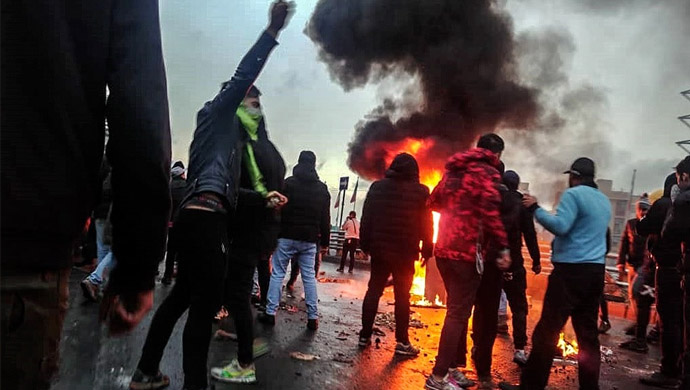February 4 marked the beginning of the second round of hearings in the Aban Tribunal, a London-based unofficial court that is hearing testimonies by witnesses of atrocities committed by Iranian security forces during the November 2019 protests. The witnesses, who include protesters, families of murdered civilians, hospital personnel, former prisoners, and even security and prison authorities, give a harrowing accounts of how the Iranian regime brutally suppressed the largest national uprising since the 1979 revolution.
In the span of a few days, regime security forces shot and killed more than 1,500 civilians, wounded thousands, and arrested many more. One of the witnesses who testified in the Aban Tribunal and whose sister was murdered by security forces, said, “My sister went to the pharmacy to buy medication for her daughter. On the way back home, she saw a youth who had been shot. She went to help the youth and untied her scarf to bandage his injured leg. As she was wrapping his leg, she got shot from behind. A member of the Basij who was shooting at people shot both my sister and the injured youth and kills both of them instantly.
“One witness said that after she was shot, security forces took away both her and the man on security buses with them. My sister’s husband and her landlord called her but no one answered the phone. After several attempts, a man answered the phone and explained to my sister’s husband that the owner of the phone was a lady, she was bandaging the foot of an injured youth. After she was shot, they took the young lady inside and bus and took her away.
“Her phone was never recovered. Apparently, the man who had recovered her phone and wanted to give it back was shot too and arrested.
“My brother, brother-in-law, and mother wanted to get her body from the hospital. But they were told that the body had been sent to the coroner’s office in Bagher Abad, Behesht-e Zahra. My brother went to the coroner’s office but was told that the body has not been delivered there.
“My brother went back to the hospital but was again told that the body has been sent and is on its way [ to the coroner’s office]. My brother made the same trip several times that day, but they did not answer him that day. When he wanted to get the body with the help of his friends, he was told that he had to pay 200 million rials. He asked why? They told him, ‘We don’t know. We were told by higher authorities that you must pay 20 million in expenses.’
“After my brother explained the financial conditions of our brother-in-law and ourselves, they accepted to hand over the body for 45 million rials, and they got their 45 million.
“After delivering the body, security agents told my brother to promise that there would be no funeral ceremony. They first said that he could only bury the body with one or two of his brothers. Then they only permitted that my brother and sister attend the funeral.”
Another witness explained the regime’s arbitrary and extrajudicial arrests and the conditions of prisoners in the regime’s prisons.
The witness said, “None of the people arrested at the rallies in the streets or afterward by the Basij and Revolutionary Guards and the State Security Force, were given due process on their charges or given any rights.
“The State Security Force and the plainclothes agents, which is not clear to which law enforcement body they belong, without any regard to the laws of carrying and using firearms, shot the people who attended the peaceful rallies at close range. Unfortunately, it resulted in the injury and deaths of many of these people across Iran.
“They would beat and torture people they had arrested and taken to their detention centers. After the rallies ended and the situation became calm, these forces had free rein to torture those arrested.
“Or they would raid the homes of the people they thought would potentially participate in rallies the next day. Unfortunately, in these raids, even people who had not taken part in any rally or people who were relatives of protesters were persecuted or arrested and imprisoned. The people imprisoned extrajudicially, without due process, and held in public detention centers—in large cities, numbered more than 100. They were kept in these detention centers and the authorities treated them however they wanted.
“They didn’t conform to the basic rules of detention centers or show any regard for the basic rights of detainees. Unfortunately, in those days, these people were treated like prisoners of war who had gone missing.”
Hundreds of people have declared their readiness to testify in the Aban Tribunal. In this round, the court will hear the testimonies of 110 people.
The plaintiffs and prosecutors have pressed charges against 160 regime authorities for their role in the massacre of protesters, including regime supreme leader Ali Khamenei, then-president Hassan Rouhani, then-judiciary chief Ebrahim Raisi, Revolutionary Guards commander-in-chief Hossein Salami, and other national and local authorities.





